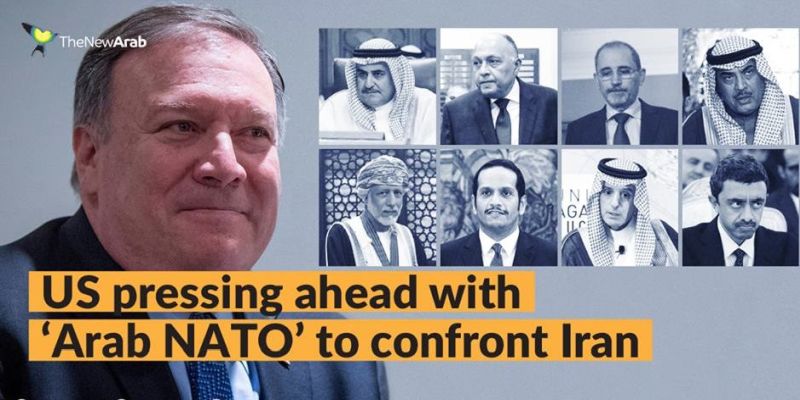Trump’s Grand Design for an Arab NATO Goes Slow
US President Donald Trump has talked about creating a Sunni Arab alliance, a kind of Arab NATO, for countering Iran’s expansionist drive in the Middle East. It even has a name and an acronym: Middle East Strategic Alliance or MESA. DEBKA Weekly’s Gulf sources report that its first candidates for membership are Oman, Bahrain, Saudi Arabia, the United Arab Emirates and Qatar. Trump’s adviser Jared Kushner is on a tour of their capitals to promote MESA, while ostensibly pitching the US Israeli-Palestinian peace plan.
Trump intends the forces of this alliance to assume control of northern and eastern Syria backed by US air cover from its bases in Iraq. Kushner is treading in the footsteps of Secretary of State Mike Pompeo who, in mid-January, went on a mission to enlist eight countries to MESA. This organization, he said, would both counter threats to the region and promote economic and energy cooperation. Kushner was given the job of giving the plan concrete form.
When he presented the US peace plan in a Sky Arabic interview on Monday, Kushner accentuated the importance of creating a new Palestinian economic dynamic before getting down to political solutions and reconciling the rival Hamas and Fattah factions. DEBKA Weekly’s sources disclose that Kushner, by this ploy, hoped to open Arab doors to accepting military and intelligence support from Israel, as well as America, for their initial contributions of personnel to MESA.
Israel already quietly tenders military aid to Egypt for its fight against Islamic State terrorists in Sinai, intelligence assistance to Saudi Arabia and the UAE in Yemen and military ad intelligence backing for Jordan to counteract Iran’s mounting influence in Iraq. However, Israeli military support for an Arab alliance operating in an Arab country like Syria, even on a limited scale, would constitute a radical departure from all previous norms in inter-Arab relations. It would also be seen by Russia and Iran as encroaching on their turf.
The Russians quickly caught on to its implications. On Feb. 25, Russian Foreign Minister Sergei Lavrov commented: “The United States is trying to impose the creation of the so-called Arab NATO, the Middle East Strategic Alliance, despite serious doubts of its possible members,” he said. The steps to reshape geopolitical landscape are made in a way to obstruct the natural development of events and try to contain the formation of new growth centers.” Lavrov was speaking in Ho Chi Minh City at the International Cooperation in a Troubled World conference organized by the Valdai International Discussion Club in partnership with the Diplomatic Academy of Vietnam.
In the Gulf, meanwhile, Kushner, who is accompanied by Jason Greenblatt, Trump’s special envoy for international negotiations and US Special Representative for Iran, Brian Hook, wasn’t make much progress. On Monday, Feb. 25, they called on Oman’s Sultan Qaboos bin Said al Said and the UAE Crown Prince Mohammed bin Zayed Al Nahyan. The Omani ruler flatly declined to join any new fronts or allocate any forces.
The timeline for the US delegation to visit Riyadh is undisclosed on security grounds. In any case, the Saudis are busy with their own affairs. Saudi Crown Prince Muhammed bin Salman has just recalled his brother Prince Khaled from his post as ambassador to Washington and appointed him deputy defense minister with the rank of minister. Khaled is a former F-15 pilot and tactical intelligence officer with the Saudi Royal Air Force. He received his initial training at Randolph Air Base in San Antonio, Texas, and advanced training at the Columbus Air Base in Columbus, Mississippi. He went on to study advanced electronic warfare in France. During his tenure as a Saudi Royal Air Force pilot, he carried out many combat missions as part of international coalition campaigns.
Before he had a chance to warm his new seat, Prince Khaled was dispatched by his brother to Yemen and southern Saudi Arabia. His pep talks to the officers and men fighting the Houthi insurgency in Yemen there and guarding the kingdom’s southern border were full of praise for their valiant efforts and spiced with pay rises all round.
It is hard to see the new Saudi defense chief, who has his hands full with implementing his brother’s plans for revamping the Saudi armed forces’ high command, sparing time or personnel for the US Middle East NATO.


